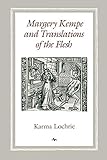Margery Kempe and Translations of the Flesh / Karma Lochrie.
Material type: TextSeries: New Cultural StudiesPublisher: Philadelphia : University of Pennsylvania Press, [2012]Copyright date: ©1992Description: 1 online resource (268 p.) : 4 illusContent type:
TextSeries: New Cultural StudiesPublisher: Philadelphia : University of Pennsylvania Press, [2012]Copyright date: ©1992Description: 1 online resource (268 p.) : 4 illusContent type: - 9780812215571
- 9780812207538
- 248.2/2/092 B
- PR2007.K4 ǂb Z77 1991eb
- online - DeGruyter
| Item type | Current library | Call number | URL | Status | Notes | Barcode | |
|---|---|---|---|---|---|---|---|
 eBook
eBook
|
Biblioteca "Angelicum" Pont. Univ. S.Tommaso d'Aquino Nuvola online | online - DeGruyter (Browse shelf(Opens below)) | Online access | Not for loan (Accesso limitato) | Accesso per gli utenti autorizzati / Access for authorized users | (dgr)9780812207538 |
Frontmatter -- Contents -- Acknowledgments -- Introduction -- 1. The Body as Text and the Semiotics of Suffering -- 2. The Text as Body and Mystical Discourse -- 3. From Utterance to Text: Authorizing the Mystical Word -- 4. Fissuring the Text: Laughter in the Midst of Writing and Speech -- 5. Embodying the Text: Boisterous Tears and Privileged Readings -- 6. The Disembodied Text -- Bibliography -- Index -- Backmatter
restricted access online access with authorization star
http://purl.org/coar/access_right/c_16ec
Selected by Choice magazine as an Outstanding Academic Book for 1999Karma Lochrie demonstrates that women were associated not with the body but rather with the flesh, that disruptive aspect of body and soul which Augustine claimed was fissured with the Fall of Man. It is within this framework that she reads The Book of Margery Kempe, demonstrating the ways in which Kempe exploited the gendered ideologies of flesh and text through her controversial practices of writing, her inappropriate-seeming laughter, and the most notorious aspect of her mysticism, her "hysterical" weeping expressions of religious desire. Lochrie challenges prevailing scholarly assumptions of Kempe's illiteracy, her role in the writing of her book, her misunderstanding of mystical concepts, and the failure of her book to influence a reading community. In her work and her life, Kempe consistently crossed the barriers of those cultural taboos designed to exclude and silence her.Instead of viewing Kempe as marginal to the great mystical and literary traditions of the late Middle Ages, this study takes her seriously as a woman responding to the cultural constraints and exclusions of her time. Margery Kempe and Translations of the Flesh will be of interest to students and scholars of medieval studies, intellectual history, and feminist theory.
Mode of access: Internet via World Wide Web.
In English.
Description based on online resource; title from PDF title page (publisher's Web site, viewed 08. Aug 2023)


